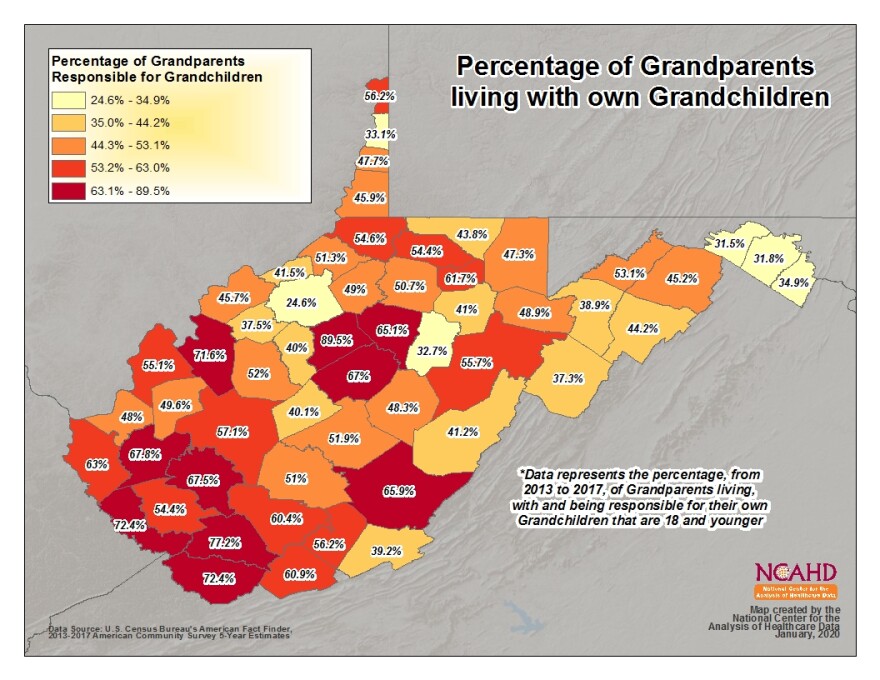The Centers for Disease Control and Prevention warns that older adults and people with underlying chronic health conditions are at increased risk for serious illness from the coronavirus.
According to the Kaiser Family Foundation, West Virginia has the highest percentage of at-risk adults of any state in the country.
This is one of the reasons Gov. Jim Justice gave at a press conference on March 13, when he announced that schools would close.
“We’re in an older state, and the elderly is where this monster attacks,” Governor Justice warned.
Some grandparents found relief in the Governor’s message because they feared that their grandchildren might unknowingly bring the virus home to them. This is especially meaningful in West Virginia where 29,000 children are being cared for by their grandparents, according to the Annie E. Casey Foundation Kids Count data for 2018. For many of West Virginia’s kids, grandparents are the only caregivers they have.
St. Albans grandmother, Gigi Bays, is raising three young grandchildren. She is busy these days making sure her older two grandsons are doing their schoolwork and that her house is staying clean. As a former pharmacy technician at a hospital, she says she knows how to disinfect.
“Let’s go back to like I’m working in the IV-room mode,” said Bays. “You know where every single thing we touch has to be sterilized.”
Bays, who is 60 years old, is on the cusp of the population that’s most at risk of serious illness from the coronavirus.
This includes people 65 years or older, those living in nursing homes, and those with certain chronic diseases, including lung disease, moderate to severe asthma, and serious heart conditions, among others.
Becoming seriously ill is a common fear among grandparents who are raising their grandchildren, according to Bonnie Dunn, statewide director of Healthy Grandfamilies. Dunn said this is one of the biggest fears grandparents have told her they have.
“If it’s a great-great grandparent, and we had four great-greats in the program over the age of 80 who were raising great-greats under the age of 10, you have to be real about it,” Dunn said. “Life is short at that point.”
The Healthy Grandfamlies program offers support for grandparents, from making contingency plans to dealing with school and technology, and especially at this time, Dunn wants grandparents to know about the program’s resources. She said it’s fortunate the program recently launched statewide.
“There is a structure in place to get help to these families,” Dunn said.
The structure includes a Healthy Grandfamilies program coordinator in every county. Julia Hamilton serves in this role for Monongalia County. She’s ready to answer the call of grandparents who need help.
“The idea of facing the next who knows how long as being the only one who is interacting with your grandkids, I would imagine we might get a phone call or two about that,” Hamilton said.
West Virginia is in its third week with schools and daycares closed. Hamilton said calls last week to the grandparents she’s worked with in Monongalia County found all in good spirits. Hamilton said school personnel are also using at-home meal deliveries as an opportunity to check on families.
Some grandparents continue to work, though, including Anita Dewitt, of Monongalia County, who is caring for three grandchildren. Dewitt works in billing at a hospital. She’s not worried about her own health. But she is worried for her 73-year-old mother-in-law who also lives with them and takes care of the grandchildren while Dewitt and her husband work. They’re taking precautions.
“Showering as soon as we walk in the door, making sure we’re washing our hands as much as we can at work,” Dewitt said. “Not letting anybody out of the house, keeping my mother-in-law in.”
For information on Healthy Grandfamilies visit the program’s website where information about each county’s coordinator is listed. Grandparents seeking resources from the program may also call 211 and tell the operator they are a grandparent who’s raising their grandchildren. The operator will use the caller’s zip code to connect them to the Healthy Grandfamilies coordinator in their county.





















